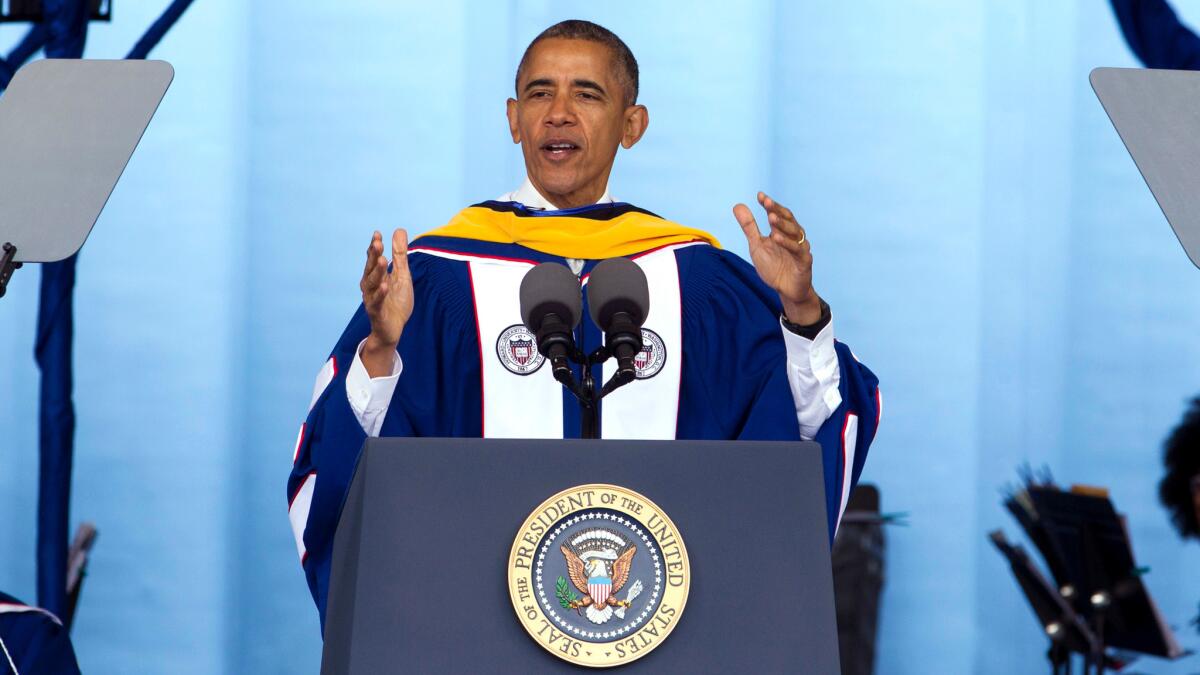Column: Why the right hides from its own good luck

- Share via
Is there anyone more obnoxious than the person who, in the face of gushing admiration over her professional achievements, her perfect family, her lavishly appointed home, responds demurely, “We’ve been very fortunate”?
Yes, there is. It’s the person who denies his luck and good fortune, who attributes his success and prosperity solely to his own fortitude and brute strength where his bootstraps are concerned. Often this person refers to having “built my house myself” when he means he hired a contractor, who then hired subs to build it for him.
Most of us are guilty of some version of the above. Climbing the success ladder may be a national obsession, the cornerstone of the self-mythologized American dream, but that doesn’t mean we talk about it very gracefully. Especially now that some social justice activists have rendered privilege as a sort of moral defect, it’s easy to feel not just protective of but defensive about what you’ve achieved and acquired.
The idea that luck and hard work operate in tandem should be no more difficult to grasp than the idea that good health requires good habits and good genes.
President Obama’s commencement speech at Howard University this month, in which he called on graduates to recognize that they weren’t the sole authors of their success, was about as bipartisan as it could get. He even went after left-wing dogma, expressing disapproval of colleges that disinvite controversial speakers and of hollow hashtag activism.
Nonetheless, conservative critics, with their highly trained noses for cherry-pickable quotes from a president they abhor, sniffed out offense anyway.
“Progressives by definition,” Mike Huckabee began on his blog, “must believe that the wealthy and successful among us have ‘won life’s lottery’ and are ‘fortunate’ to be where they are.” The Weekly Standard excerpted 400 words of the 5,000-word speech and slapped it with a troll-baity headline and subhead that repeated Obama’s line: “Pet peeve of mine: people who have been successful and don’t realize they’re lucky.”
The idea that luck and hard work operate in tandem should be no more difficult to grasp than the idea that good health requires good habits and good genes. Still, in a world where the left and right function not just as ideological adversaries but as rival gangs looking for a fight, the luck-versus-merit conversation isn’t actually a conversation but a debate.
In a new book, “Success and Luck: Good Fortune and the Myth of Meritocracy,” economist Robert H. Frank does his level best to disabuse the bootstraps crowd of at least some of their Horatio Alger fantasies. Allowing (as any reasonable person would) that “success is extremely difficult to achieve without hard work,” Frank suggests that we are all nonetheless at the mercy of accidents of timing and twists of fate. These range from big factors (being born in a prosperous country) to the barely perceptible (being born in a month that allows you to enroll earlier in a youth sport, thereby gaining an advantage of more practice and coaching than others in your age group).
But even those of us who accept that luck plays a role in our lives may be reluctant to acknowledge to what extent it shapes us. After all, it’s one thing to thank your lucky stars you were born in the U.S. in the age of vaccines, refrigeration and anesthesia, and quite another to admit your successes are due in large part to that most unconvivial of collaborators, random chance.
According to Frank, there’s a solid psychological reason this credit is so difficult to extend. “Denying the importance of luck,” he writes, “may actually help people surmount the many obstacles that litter almost every path to success.”
In other words, in order to persevere, especially when the reward lies at the end of a long road or may never come at all, we almost have to trick ourselves into believing that we alone hold the key to our fate.
That little head-game may explain the right’s difficulty in admitting that anything other than their own tireless labor got them to where they are. But their insistence that success and failure are entirely self-determining propositions is not only myopic but almost head-scratchingly unsophisticated. “With the opportunities that exist in America for those who work hard for their education, stay out of trouble and employ a sound work ethic,” Huckabee continued in his post, “‘luck and fortune’ have little to do with success any more.”
Little to do with it? Come on. There’s no such thing as success without a little luck. What we do with it is between us and our bootstraps.
MORE MEGHAN DAUM
#FreeToBleed? No thanks. Sometimes, discretion is the better part of activism
If you’re shocked by Donald Trump, it’s probably time to take the bubble quiz
Madeleine Albright a war criminal? Scripps College’s baffling crusade for simple thinking
mdaum@latimescolumnists.com
Twitter: @meghan_daum
Follow the Opinion section on Twitter @latimesopinion and Facebook
More to Read
A cure for the common opinion
Get thought-provoking perspectives with our weekly newsletter.
You may occasionally receive promotional content from the Los Angeles Times.







